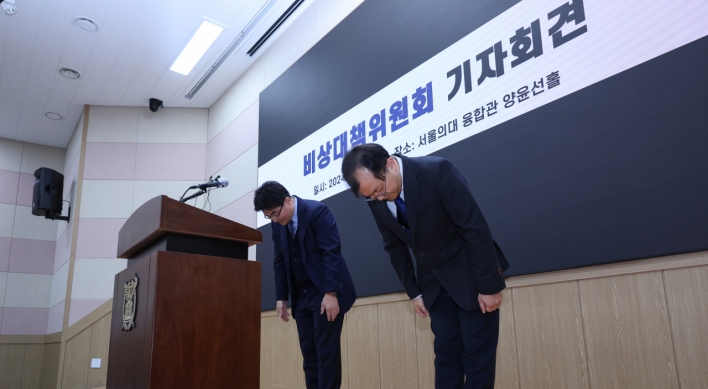Foreign investors are seen to have sold up to 2 trillion won ($1.8 billion) in the main bourse here this month, most likely affected by the default concerns in major emerging countries.
Overseas investors net-sold local shares worth 314.6 billion won on the Korea Exchange on Tuesday, after net selling 524.5 billion won in Monday’s trading to post record-breaking sales for this month, according to industry data.
So far this year, their combined net-selling came to 1.68 trillion won, and equity market insiders predict their dumping streak would continue until Wednesday, which is the last trading session of January. Foreign investors will have net sold around 2 trillion won worth of local shares, they said.
Research analysts shared the view that the heavy selling by foreign investors is attributable to financial woes in the emerging markets, such as Argentina and Turkey, and the United States’ reported move to further scale back its economic stimulus package.
The two-day meeting of the U.S. Federal Open Market Committee, slated for Jan. 28-29, could have a further negative impact on Korea’s financial indices for stock prices and currency exchange rates depending on whether the FOMC will strengthen or weaken tapering, industry watchers and policy makers said.
“Should the U.S. monetary policymakers decide to increase its tapering of quantitative easing amid symptoms of economic recovery this week, it will be somewhat feasible for the Korean financial market to see a massive outflow of foreign capital,” a director general of the Financial Supervisory Service.
However, since the U.S. appears poised to continue on the path of tapering, he pointed out that “the key issue over the next few months is whether Korea as well as other Asian countries will effectively weather the outflow from developed countries’ exit strategy.”
Bank of Korea Gov. Kim Choong-soo on Tuesday tried to downplay fears, saying that the pace of U.S. tapering has already been forecast and that nothing unexpected would come from the FOMC meeting.
Kim said, however, it was necessary to more closely monitor external factors, as “the present economic situation (including the emerging market distress) was not foreseen.”
Amid growing uncertainties, the Korea Composite Stock Price Index has remained volatile, while the Korean currency continued to lose ground against the U.S. dollar. The main index closed at 1,916.93 won, and the won-dollar exchange rate closed at 1,081.2 won on Tuesday.
On Monday, the Argentine government had announced that it would allow citizens to buy up to 2,000 U.S. dollars per month, along with reduced tax rates on the currency purchases.
The relaxed restrictions are a part of measures to tackle the country‘s double-digit inflation and the biggest drop in the local peso’s value in over a decade.
By Kim Yon-se (kys@heraldcorp.com)
Overseas investors net-sold local shares worth 314.6 billion won on the Korea Exchange on Tuesday, after net selling 524.5 billion won in Monday’s trading to post record-breaking sales for this month, according to industry data.
So far this year, their combined net-selling came to 1.68 trillion won, and equity market insiders predict their dumping streak would continue until Wednesday, which is the last trading session of January. Foreign investors will have net sold around 2 trillion won worth of local shares, they said.
Research analysts shared the view that the heavy selling by foreign investors is attributable to financial woes in the emerging markets, such as Argentina and Turkey, and the United States’ reported move to further scale back its economic stimulus package.
The two-day meeting of the U.S. Federal Open Market Committee, slated for Jan. 28-29, could have a further negative impact on Korea’s financial indices for stock prices and currency exchange rates depending on whether the FOMC will strengthen or weaken tapering, industry watchers and policy makers said.
“Should the U.S. monetary policymakers decide to increase its tapering of quantitative easing amid symptoms of economic recovery this week, it will be somewhat feasible for the Korean financial market to see a massive outflow of foreign capital,” a director general of the Financial Supervisory Service.
However, since the U.S. appears poised to continue on the path of tapering, he pointed out that “the key issue over the next few months is whether Korea as well as other Asian countries will effectively weather the outflow from developed countries’ exit strategy.”
Bank of Korea Gov. Kim Choong-soo on Tuesday tried to downplay fears, saying that the pace of U.S. tapering has already been forecast and that nothing unexpected would come from the FOMC meeting.
Kim said, however, it was necessary to more closely monitor external factors, as “the present economic situation (including the emerging market distress) was not foreseen.”
Amid growing uncertainties, the Korea Composite Stock Price Index has remained volatile, while the Korean currency continued to lose ground against the U.S. dollar. The main index closed at 1,916.93 won, and the won-dollar exchange rate closed at 1,081.2 won on Tuesday.
On Monday, the Argentine government had announced that it would allow citizens to buy up to 2,000 U.S. dollars per month, along with reduced tax rates on the currency purchases.
The relaxed restrictions are a part of measures to tackle the country‘s double-digit inflation and the biggest drop in the local peso’s value in over a decade.
By Kim Yon-se (kys@heraldcorp.com)



![[Exclusive] Korean military set to ban iPhones over 'security' concerns](http://res.heraldm.com/phpwas/restmb_idxmake.php?idx=644&simg=/content/image/2024/04/23/20240423050599_0.jpg&u=20240423183955)

![[Graphic News] 77% of young Koreans still financially dependent](http://res.heraldm.com/phpwas/restmb_idxmake.php?idx=644&simg=/content/image/2024/04/22/20240422050762_0.gif&u=)




![[Pressure points] Leggings in public: Fashion statement or social faux pas?](http://res.heraldm.com/phpwas/restmb_idxmake.php?idx=644&simg=/content/image/2024/04/23/20240423050669_0.jpg&u=)








